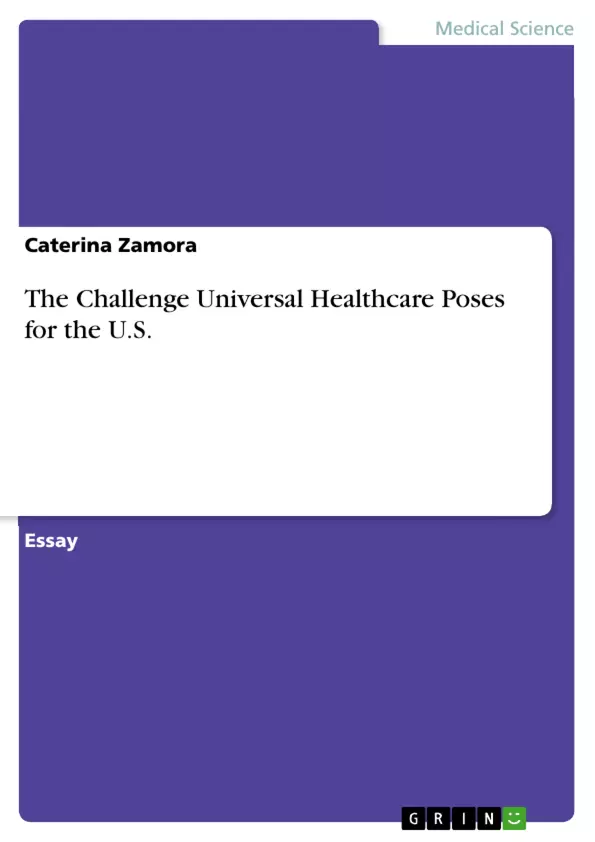This article reflects on the reasons universal healthcare in the United States is a topic that causes so much division, both in public opinion and among differing political ideologies and why it has not been adopted. Additionally, recent data is analyzed on the real financial costs of the Affordable Care Act (ACA) of 2016 in contrast to the private medical sectors. Furthermore, a comparison between the numbers of treated patients, their recovery and/or death rate both in the U.S. and other Western modern nations who do offer universal healthcare to all of its citizens draw the real picture of the quality of healthcare Americans have access to. Lastly, assumptions of differing positions are laid out and arguments are arranged and examined in syllogisms and other mechanisms belonging to the field of logic.
Inhaltsverzeichnis (Table of Contents)
- Abstract
- The Challenge Universal Healthcare Poses for the U.S.
- Historical Background
- Old and New Arguments Against Universal Healthcare in the U.S. and Counterarguments
- Universal Healthcare Will Stifle Investigation
- Fear of Government Intervention
- Is it Against the American Way of Life/Ideological Opposition
- Conclusion
- References
Zielsetzung und Themenschwerpunkte (Objectives and Key Themes)
This article explores the reasons why universal healthcare in the United States is a divisive topic, analyzing both public opinion and differing political ideologies. It examines why this system has not been adopted in the U.S., comparing the real financial costs of the Affordable Care Act (ACA) with the private medical sector. The article also contrasts the number of treated patients and their recovery/death rates in the U.S. with other Western nations that offer universal healthcare, revealing the true picture of the quality of healthcare available to Americans. Lastly, it presents various positions on the issue, examining arguments through syllogisms and other logical mechanisms.
- The historical and political context surrounding universal healthcare in the U.S.
- The economic costs and benefits of universal healthcare compared to the private healthcare system.
- The quality of healthcare in the U.S. compared to other developed nations with universal healthcare.
- The arguments against universal healthcare and their underlying motivations.
- The ethical and societal implications of a universal healthcare system.
Zusammenfassung der Kapitel (Chapter Summaries)
The article begins by explaining how America's resistance to adopting a universal healthcare system is deeply rooted in historical, economic, and ideological factors. The historical background traces the influence of the fear of communism and socialist regimes during Truman's presidency, which led to a preference for private entrepreneurship over federal government intervention in healthcare.
The chapter on arguments against universal healthcare presents three main reasons: the belief that universal healthcare would stifle scientific research and innovation, the fear of government intervention, and the ideological opposition to universal healthcare as being against the American way of life.
The section on "Universal Healthcare Will Stifle Investigation" refutes this claim by highlighting the significant role of the National Institutes of Health (NIH), funded by the federal government, in supporting medical research and breakthroughs. It compares the high healthcare spending in the U.S. with the mediocre outcomes achieved compared to other Western nations with universal healthcare systems.
The "Fear of Government Intervention" section examines the argument that government involvement in healthcare could lead to rationing of treatments based on cost-effectiveness. The chapter on "Is it Against the American Way of Life/Ideological Opposition" discusses the ideological opposition to universal healthcare, rooted in beliefs about individual freedom, free market principles, and limited government.
Schlüsselwörter (Keywords)
The primary terms and concepts explored in this article include universal healthcare, innovative medicine, the Affordable Care Act (ACA), administrative costs, medical costs, and the National Institutes of Health (NIH).
Frequently Asked Questions
Why does the U.S. not have a universal healthcare system?
The resistance is rooted in historical fears of government intervention (dating back to the Cold War), ideological beliefs in free-market principles, and the political power of the private medical sector.
Does universal healthcare stifle medical innovation?
The article refutes this claim by noting that much of U.S. medical research is already funded by the federal government through the National Institutes of Health (NIH), rather than solely by private profit motives.
How does the quality of U.S. healthcare compare to nations with universal systems?
Data shows that despite higher spending, the U.S. often has lower recovery rates and higher infant mortality or death rates compared to Western nations that offer healthcare to all citizens.
What is the "Affordable Care Act" (ACA)?
The ACA, often called Obamacare, was a 2010 reform aimed at increasing health insurance coverage, though it stopped short of creating a true universal, single-payer healthcare system.
What are the main ideological arguments against universal healthcare?
Critics often argue it is "un-American," claiming it limits individual freedom, leads to treatment rationing, and represents an overreach of federal government power.
- Quote paper
- Caterina Zamora (Author), 2020, The Challenge Universal Healthcare Poses for the U.S., Munich, GRIN Verlag, https://www.grin.com/document/900577



